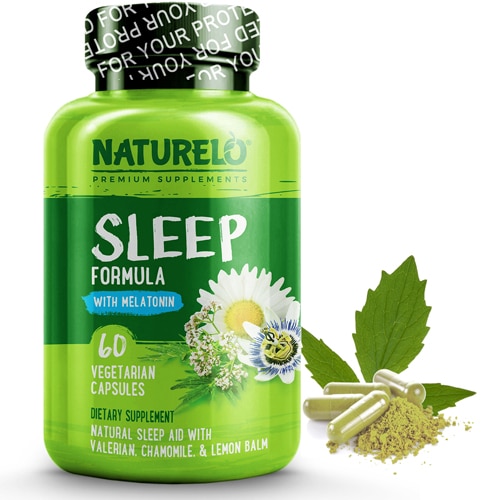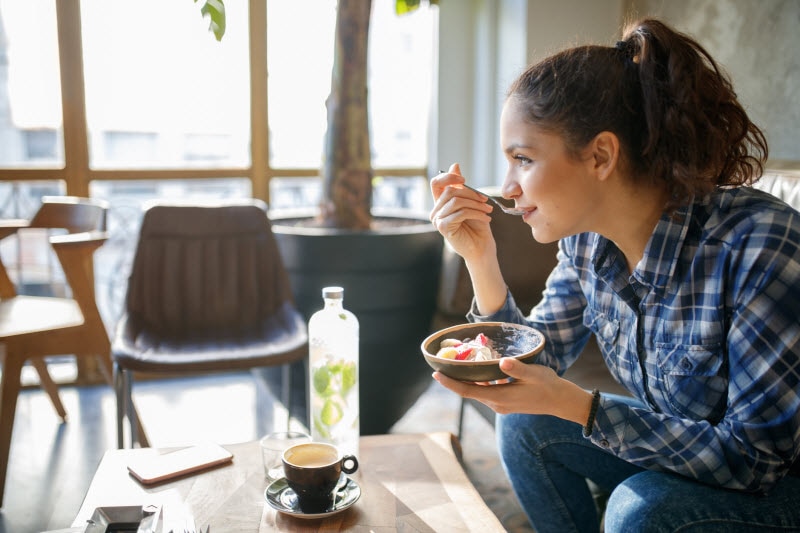Every night, you take a warm bath, cut off screen time and quietly read a book before going to bed. But you’re still up, tossing and turning, all night long. Does this sound familiar? If so, it's possible that your diet may be at fault. Sure, greasy, unhealthy foods can give you an upset stomach that disrupts slumber – but French fries and pizza aren't the only culprits. In fact, healthy snacks can do a number on your sleep, too. Here are some foods you may want to consider cutting from the evening menu for better slumber.
Foods Not to Eat at Night
1. High-fat foods
Whether they’re part of your dinner or a late-evening snack, high-fat foods may be affecting your sleeo. Fats are known to sit in your stomach all night It takes fatty foods a long time to digest, which often leads to heartburn, indigestion and an upset stomach. You're likely to notice more bloating come morning, as well. All of these things interfere with sleep in various ways. You might get stuck running to the bathroom in the middle of the night, or tossing and turning due to discomfort.
2. Cured meaty snacks
A stack of pepperoni slices or a little bit of bacon may seem like a filling, high-protein treat, but cured meats have a high tyramine content. Tyramine is an amino acid whose job it is to increase the amount of norepinephrine secreted by your brain. Norepinephrine is a stimulant, so you can understand why you don't want a big boost of it before you hit the hay. If you need something meaty to send you off to sleep, have a snack that helps your brain to release serotonin instead. In addition to a variety of supplements that can help nudge you off to sleep, a turkey sandwich may do the trick. You don't even have to skip the bread!
3. Anything with coffee or caffeine
You know you shouldn't have coffee before bed, right? Even a decaf latte can keep you awake. Don't indulge in that bowl of coffee ice cream (yes, that counts!), and stop drinking sodas long before you try to fall asleep. Certain teas contain too much caffeine, as well. If you're looking for a little jolt around the evening time, consider swapping your coffee for matcha green tea. Its caffeine effect is steadier than coffee or other forms of caffeine. Drink it in the late afternoon or early evening, and you'll feel energetic and rejuvenated throughout the rest of your day with no crash later. Matcha green tea can even leave you feeling relaxed and stress-free once you tuck yourself under your covers.
4. Raw veggies
They’re one of the best snacks you can eat, right? Well, that depends on what time of day it is. While it’s true that a plate of carrots, cauliflower and broccoli provides stellar nutrition and will fill you up, raw veggies take a long time to digest. Your digestive tract has to work overtime to break down the fibers of uncooked vegetables. If you eat them before bedtime, your stomach will be working on digesting as you try to fall asleep, causing feelings of discomfort and possibly gas. Instead, look for snacks that contain magnesium or tryptophan. Or, consider a vitamin or supplement with those nutrients.
5. Chocolate treats
Chocolate, unfortunately, isn't the best late-night snack. In fact, it’s a a source of caffeine, which explains why that bowl of ice cream or that delicious candy bar keeps you up when you want to fall asleep. You're not safe just because you eat dark chocolate, even though it's healthier for you. Milk chocolate and other varieties with higher sugar content are even worse. They pack a double punch, with caffeine and sugar working together to keep you awake.
6. Spicy foods
Spicy delicacies might speed up your metabolism, but they're definitely not ideal before bedtime. Eat them too late, and they can leave you incredibly uncomfortable. You sweat more, and you may suffer a night of heartburn. Furthermore, spicy foods raise your core body temperature. To sleep well, your temperature needs to decrease. After consuming something hot, you're left feeling wide awake and unable to relax enough to drift off to sleep. Instead, try munching on some tuna—but not spicy tuna! White fish is a lean protein which keeps indigestion and acid reflux at bay.
7. Dried fruits
You'd think that dried fruits would be a healthy midnight snack, right? After all, what's healthier than fruit? While you can safely eat certain fruits, such as berries or bananas, to help you to feel sleepy, certain brands of dried fruit may contain excess sugar. Be sure to take a few minutes to scan the ingredient lists of products for added sweeteners before purchasing.
Dried fruit makes a fantastic snack during the day due to its high fiber content and low amounts of water, but you should only eat it as a snack when you're up and moving around actively. Otherwise, dried apricots, apples, prunes and raisins can cause gas and stomach aches.
8. Sweet cereals
There's nothing like a bowl of cereal before heading off to bed. Better yet, there's nothing like a bowl of cereal in bed, perhaps while you binge watch your favorite show on Netflix. Some cereals are OK; however, sweet, sugary cereals are terrible for your sleep. It's not just the high sugar content, although that's a big reason to resist the lure of Lucky Charms and Fruity Pebbles. The carbs can wreak havoc on your system as well. Sweet cereals spike your blood sugar, which then crashes while you try to sleep. The results are disastrous, and you won't feel at all rested the next morning.
9. Water-heavy fruits and vegetables
Cucumbers and watermelon are fantastic snacks throughout the day. But at night? Not so much. Their high water content may be excellent at hydrating, but it also might make you have to visit the bathroom repeatedly during the night. Besides the fruit, try to avoid drinking too much water as you get closer to bedtime (unless you're brewing a cup of relaxing chamomile tea)!




